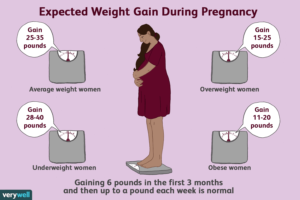Nutrition In Pregnancy
Posted on November 15th, 2019 to Healthy Lifestyle in Pregnancy
What foods help grow a healthy baby?
Growing a healthy baby begins with eating a healthy diet. But where do you start?
The basics are to eat a well-balanced, lower fat diet made up of protein sources, whole grains, fresh fruits and vegetables, dairy products, and plenty of water. Avoid empty calories in junk food, soda pop, desserts/sweets and substances such as alcohol, cigarette or marijuana smoking/vaping, or other recreational drugs.
As a general rule if you eat:
- 3-4 servings of protein
- 4 servings (or more) of fresh fruit and vegetables of varying colors
- 2-3 serving of whole grains (rice, breads, pasta)
- 4 servings of dairy per day
You will have a well-balanced nutrient rich diet
Protein is essential for baby’s growth especially in the second and third trimesters. 70 – 80 grams of protein per day are recommended. Protein sources include: Meat, Fish, Nuts, Eggs, Soy, and Beans/legumes. A quick reference to help add up how many grams of protein you are already eating is this: 1 ounce of meat or fish (or ½ cup cooked beans) = 7 grams of protein. Generally a normal serving of meat is ~ 3 ounces and is about the size of a deck of cards.
Other examples:
- Hamburger patty ~4 oz = 28 grams
- Steak ~ 6 oz = 42 grams
- Chicken breast ~ 3.5 oz = 30 grams
- Can Tuna = 40 grams
- Egg (one) = 6 grams
- Milk (1 cup) = 8 grams
- Peanut Butter ~ 2 TBS = 8 grams
Avoid deep sea fish such as Tuna steaks, swordfish, king mackerel , and shark as they can carry high levels of mercury which are dangerous to growing babies.
Dairy products provide crucial calcium for baby’s bone development and provide a source of protein. Choosing lower fat dairy products provide the same amount of protein and calcium with less calories. 1000 mg calcium each day is recommended and ingesting that from a food source is better absorbed by the mother’s body than taking a supplement. Read the label of your dairy product to see how much calcium is present in one serving. Generally if you have 4 servings per day you are getting enough calcium.
Always eat pasteurized dairy products as unpasteurized dairy can carry a type of bacteria called listeria which can be dangerous to babies if a mother becomes infected from listeria.
Iron is also important to be present in your diet as it helps mothers and babies build their blood volume. Iron is an essential element in the making of red blood cells. A mother’s blood volume expands by 50% during the pregnancy and she is also providing iron to the baby to build their blood supply. 27 mg daily is what is recommended and again eating the iron in your food is much better absorbed than taking a supplement. Sources of heme iron are also better absorbed than non heme iron sources. Another easy way to increase the iron in your diet is to cook your food in a cast iron pan. The iron from the pan is absorbed by the food greatly increasing the amount of elemental iron in the food.
Avoid deli meats as well as they can carry listeria bacteria just as unpasteurized dairy can. Always eat medium to well cooked meat as under cooked red meat may carry toxoplasmosis and raw or under cooked seafood may carry Hepatitis A.
Heme sources of iron:
- Beef
- Lamb
- Pork
- Chicken or turkey
- Seafood
Sources of Non heme iron:
- Beans
- Fortified Cereals (oatmeal, breakfast cereals)
- Soy beans or Tofu
- Dark green leafy vegetables
- Dried fruit
- Molasses
These iron source are absorbed better with a vitamin C source (citrus fruits, strawberries, broccoli, orange juice)
Fruits and vegetables provide a multitude of vitamins and minerals. This is why eating a variety of colorful fruits and vegetables provide the full range of nutrition. They also provide fiber and fluids which are helpful for good digestion.
Whole grains such as brown rice, popcorn, whole wheat pastas and breads are preferred over white rice or white breads and pastas. The whole grain is digested in such a way that it is absorbed more slowly into your system and prevents high spikes in your blood sugar. White breads and pastas are absorbed quickly and act like a sugar in your system causing rapid high spikes in your blood sugar leaving your blood sugar to crash after (which makes pregnant women more nauseated or overly fatigued or unsatisfied, wanting to eat more!) Whole grains also have more fiber and more nutrition than white breads.
A daily prenatal vitamin is also recommended to make sure a woman has adequate amounts of Vit A (not more than 10,000 IU), Iodine (220 mg), Zinc (60 mg), Folic Acid (400-800 mcg), and iron (27mg). Other vitamins and minerals are also included in these prenatals. A thorough resource assessing various brands of prenatal vitamins: https://www.consumersadvocate.org/prenatal-vitamins.
There is such a thing as too much of a good thing as well. Appropriate weight gain is also important and only 1 vitamin per day along with a well-balanced diet is just right.
Weight gain recommendation is based on your BMI (Body Mass Index) http://www.nhlbi.nih.gov/health/educational/lose_wt/BMI/bmicalc.htm (link to calculate BMI)
- BMI < 18 28-40 lbs
- BMI 18-25 25-35 lbs
- BMI 25-30 15-25 lbs
- BMI > 30 11-20 lbs

Talk with your midwife or doctor about what your recommended weight should be.
Exercise is also part of a well-balanced life style for your pregnancy. It is advised you move your body for at least 30 min 5 times per week vigorously. Vigorous exercise may be started even if you are not already exercising. Starting off slowly and working up to 30+ minutes most days of the week is important. This builds healthy muscles, helps your body maintain good glucose levels throughout the day (even many hours after the exercise), promotes an active outlet for stress, facilitates an easier labor and delivery, and eases recovery of your pregnant body after the birth. (See link to exercise blog).
Some excellent types of exercise include: (avoid exercises where is a risk of falling)
- Walking
- Running/jogging
- Yoga
- Pilates
- Swimming
- Exercise machines ( elliptical, treadmill, rowing machine, stationary bike)
- Biking (not mountain biking or on a busy road)
A combination of a healthy well-balanced diet, exercise, and avoiding non-nutritious foods and dangerous substances help you to grow a healthy baby!
By Marti Churchill, CNM
Feel free to reach out to us with questions.
Interested in healthy exercise? Check out our Exercise During Pregnancy Blog.



